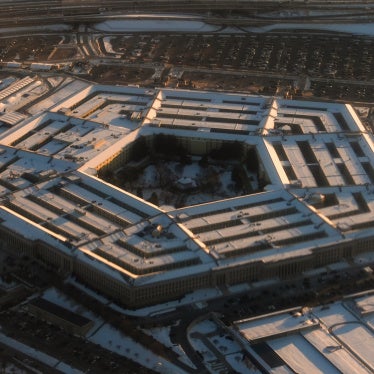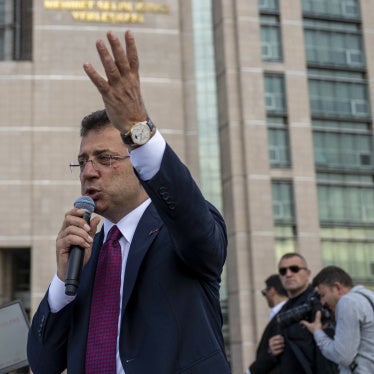Washington, DC, August 6, 2014
Her Excellency Cristina Fernández de Kirchner
President of Argentina
Buenos Aires, ARGENTINA
Dear President Fernández de Kirchner,
First, we would like to express our enormous satisfaction with the news about the identification of the grandson of Estela de Carlotto, president of the Grandmothers of Plaza de Mayo. The national and international community applauds the restitution of the identity of children illegitimately appropriated during the dictatorship, and this event has brought recognition to the decades-long struggle of women who have dedicated their lives to memory and justice in the face of one of the worst forms of abuse committed during the last Argentine military dictatorship.
Precisely for the significance that this issue has in the country, and in light of the relevance that your government has given to the protection of the right to identity, I have the honor of addressing you with the purpose of requesting information regarding the National Bank of Genetic Data. This letter is framed within the guarantees established in Decree 1172/2003 on the right to access public information.[1]
As you know, the National Bank of Genetic Data was created in 1987, with the purpose of obtaining, storing, and analyzing genetic information, in particular to facilitate the identification of children of individuals who were disappeared during the military dictatorship of 1976-1983.[2] The Bank has been instrumental in connecting more than 100 children —who were illegally appropriated during the dictatorship after their parents were disappeared— to their biological families.[3] It has also allowed other individuals to identify family members who went missing after the end of the dictatorship.
The Bank has been key in upholding the right to identity. According to the Inter-American Court of Human Rights, although the right to identity “is not found expressly established in the [American] Convention [on Human Rights], it is possible to determine it on the basis of that provided in Article 8 of the Convention on the Rights of the Child, which established that said right encompasses the right to nationality, to a name, and to family relationships.”[4] Similarly, the General Assembly of the Organization of American States has held “that the recognition of the identity of persons is one of the means through which observance of the rights to juridical personality, a name, nationality, civil registration, and family relationships is facilitated, among other rights recognized in international instruments, such as the American Declaration of the Rights and Duties of Man and the American Convention on Human Rights.”[5]
In November 2009, Congress passed a law that approved the transfer of the Bank, which currently operates in the Carlos A. Durand Hospital, to an “autonomous and stand-alone organism within the orbit of the Ministry of Science, Technology and Productive Innovation” of the Nation.[6] In addition, the law limited the Bank’s scope to include only those cases in which people went missing before December 10, 1983 – a decision that the United Nations Committee on Enforced Disappearances noted with regret in a recent report on Argentina.[7]
After the executive branch finally adopted regulatory norms to implement the law in January 2013, local human rights advocates challenged the law’s constitutionality before the courts and requested an injunction to suspend the Bank’s transfer until the courts ruled on the merits of the case. The injunction was originally granted in September 2013, but was overturned in November.[8] This last ruling was upheld by a federal court in June 2014.[9] At this writing, an appeal to this decision is pending before the Supreme Court.
Given that the transfer of the Bank now appears to be imminent, Human Rights Watch respectfully asks your government for detailed information on how it plans to implement its public policies on this matter to ensure that they respect human rights standards regarding the right to identity. Specifically:
- Which mechanisms will be adopted to guarantee the right to identity of individuals whose family members went missing after December 10, 1983? Could you please provide details regarding the government’s stated plans to create a laboratory to handle filiation cases?[10]
- Which measures will be taken to ensure that genetic samples currently stored at the Bank will not be harmed during the physical transfer of the Bank from the Durand Hospital to its new location?
- Which measures will be taken to ensure that the new site is equipped to guarantee the security of the genetic samples and the effective work of its staff?
- To the extent that the conditions under which the original consent was provided are modified under the new law and its implementation, which steps will be taken to solicit the consent of those who have provided the Bank with genetic material in the past?
Thank you in advance for your attention to this information request. Please accept the assurances of my highest esteem and consideration.
Sincerely,
José Miguel Vivanco
Executive Director, Americas Division
Human Rights Watch
[1] Decree 1172/2003, sanctioned on December 3, 2003, http://infoleg.mecon.gov.ar/infolegInternet/anexos/90000-94999/90763/nor... (accessed July 3, 2014).
[2] Law 23.511, sanctioned on May 13, 1987, http://infoleg.mecon.gov.ar/infolegInternet/anexos/20000-24999/21782/nor... (accessed June 30, 2014).
[3] Cecilia Camarano, “A triumph over lies” (“Un triunfo sobre la mentira”), Página 12, February 5, 2014, http://www.pagina12.com.ar/diario/elpais/1-239356-2014-02-07.html (accessed July 3, 2014).
[4] Specifically on Argentina, the Inter-American Court has noted that, “[i]n relation to the illicit abduction and appropriation of children, Argentine jurisprudence determined that it affected the right to identity of the victims every time that the children’s civil status had been changed and there had been an attribution of birth information that hindered knowing the true identity, eliminating any indication of the true origin and preventing contact with the true family members.” Inter-American Court, Gelman Case, Judgment of February 24, 2011, Inter-Am.Ct.H.R., (Ser. C) No. 221 (2011), paras. 122, 124. See also: Universal Declaration of Human Rights, adopted December 10, 1948, G.A. Res. 217A (III), U.N. Doc. A/810 at 71, art. 6.
[5] Ibid., para. 123.
[6] Law 26.548, sanctioned on November 18, 2009, http://www.infoleg.gov.ar/infolegInternet/anexos/160000-164999/160772/no... (accessed June 30, 2014).
[7] United Nations Committee on Enforced Disappearances, “Concluding Observations on the Report Submitted by Argentina under Article 29, Paragraph 1, of the Convention,” CED/C/ARG/CO/1, December 12, 2013, http://tbinternet.ohchr.org/_layouts/treatybodyexternal/SessionDetails1.... (accessed June 29, 2014), para. 34.
[8] Rulings by Judge Ernesto Marinelli, Federal Administrative Court (Juzgado Contencioso Administrativo Federal), Case 34598/2013, September 12, 2013; and November 29, 2013. Copy on file at Human Rights Watch.
[9] Ruling by Judges Guillermo F. Treacy, Jorge Federico Alemany, and Pablo Gallegos Fedriani, Federal Appeals Court, Chamber V, (Cámara Contencioso Administrativo Federal, Sala V), June 2014. Copy on File at Human Rights Watch.
[10] In a request for information submitted on June 5, 2014, Senator Norma Morandini asked if there had been advances in the proposed creation of this laboratory. The response by the Ministry of Science, Technology and Productive Innovation indicated that there was a draft bill that would be finalized once the Bank had moved to its new location. The response is available at: http://www.normamorandini.com.ar/?p=8287 (accessed June 30, 2014).








